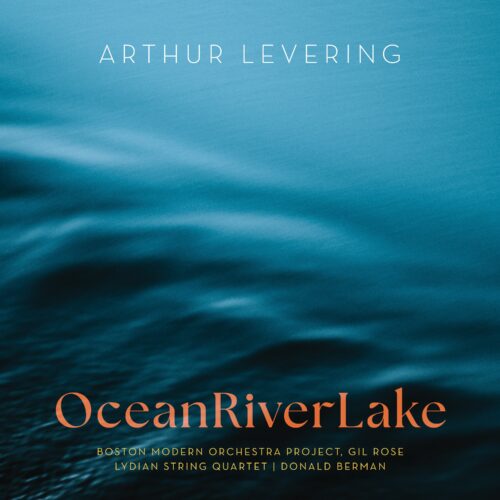Here I an discovering (as you might also) Boston-area composer Arthur Levering. The recipient of numerous awards and professional accolades, Levering’s music is vibrantly textural and colourful, in a serious but engaging contemporary idiom. It has spectral overtones mixed with Schoenbergian atonal modernism, added to expressive and discursive gestures that are typically American, post-John Adams, say.
It’s brilliant, intellectually satisfying, emotionally assertive and musically stimulating. OceanRiverLake is a triptych based on water-evoking musical references in various topological forms. The first movement, as you may have guessed, evokes Debussy’s La mer, without quoting it too explicitly. The second brings to mind Ives and Three Places in New England, while the last evokes Schoenberg and his Five Pieces for Orchestra, Op. 16, the third of which is entitled Summer Morning by the Lake. Levering is a very good orchestrator who knows how to deploy a multitude of sonic treasures with great refinement. It is a real pleasure to listen to his scores, played here with delicacy or vigour (depending on the movement) by the Boston Modern Orchestra conducted by Gil Rose.
The rest of the programme is made up of chamber scores, also beautifully constructed in colouristic, harmonic and textural terms. The surprising combination of Giocattolo, for piccolo, guitar and celesta, turns out to be quite fortunate. The nine-minute work is a delicately detailed landscape shimmering with a soft light, full of deftly interwoven sonic peckings. A little gem of musical poetry.
Squeezebox for string quartet is a set of three miniatures inspired by Celtic music, evoking the sound of a concertina, an instrument in the accordion family. The string playing is cleverly constructed to evoke the ‘breathing’ of this instrument, without neglecting the melodic aspect associated with folklore.
The programme ends with a suite in the form of a Theme and Variations for piano, Garland for Steven Stucky. Here Levering pays tribute to a colleague and compatriot who died in 2016. In it he deploys his use of the principle of compound melody (ausfaltung in German, déploiement in French). Stucky had expressed an interest in Levering’s use of this principle. This method can be described as the implication of more than one melody or line by a single voice by jumping between the notes of the two melodies. Some convincing examples exist in classical music: Bach’s Sonatas and partitas for solo violin.
In the end, Garland for Steven Stucky is a fairly advanced musical and conceptual exploration that sounds much better, narratively, than the hyper-theoretical aspect of the approach would suggest. It’s rigorous, of course, but musically rich and communicative.
If Levering was unknown to me before the arrival of this production from the New Focus label, his music is now firmly imprinted in my mind. This top-notch album will have the same effect on you, if you love music at its best and most advanced.
























